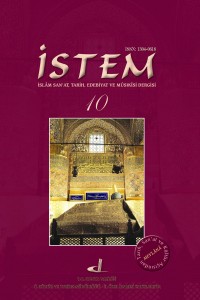Abstract
Bilgi, asırlardır felsefenin ana konu ve problemlerinden biri ola gelmiştir. Bilginin tanımı ve nasıl elde edilebilirliği konusunda, filozoflarca ortaya konmuş muazzam bir literatürün varlığına rağmen, çoğu düşünürlere göre, her ne kadar bütünüyle bir muamma olmasa da, hala cözülememiş bir meseledir. Biz bu araştırmada, bilgi kavramını ve bilginin derecelerini ve değişik uzantılarını, büyük Mutassavıf-düşünür, Mevlana Celaleddin Rumi’nin eserlerinde ve özellikle de şiirsel şahane eseri Mesnevi’sinde tezahür ettiği şekilde incelemeyi hedefledik. Aslında böylesine çok kapsamlı ve karmaşık bir konunun, bu çaplı küçuk bir makalededen öte, tamamen bağımsız ve ayrıntılı bir tez içerisinde ele alınıp incelenmesi gerekir. Bu hakikatın tam bilincinde olarak, en azından Mevlana’nın bilgi kavramının ana özelliklerini özet olarak ortaya koyabilmek ümidiyle, bu mütevazi araştırmaya teşebbüs ettik. Çalışmamız boyunca, bilgi konusundaki birtakım anahtar soruların cevabını bulmaya gayret gösterdik. İşte bu soruların bazıları: bilgi açısından insanın diğer yaratılmış varlıklar arasındaki konumu; bilginin kaynağı; bilginin çeşitleri ve dereceleri (tecrübî, aklî, hadsî veya sezgisel, zevkî, vb.); zahirî ve batınî duyuların durumları; idrak; tasavvur; akletme; keşf; gönlün duyuları; batınî ve manevi göz ya da gönül gözü, vb. Bütün bu sorular ve bunlarla ilgili meseleler, her ne kadar ayrıntılı ve kapsamlı olmasa bile, Mevlana’nın dünya görüşü çerçevesinde, burada tartışılmaktadır. Onun bilgi anlayışının genelde üç çarpıcı özelliğinin altını çizdik. Aslında bu özelliklerin her biri, kendisinden önceki İslam düşünürlerinin bıraktığı felsefî, kelamî ve tasavvufî mirasın bir takım izlerini taşımakla birlikte, aynı zamanda kendi metafizik görüşünü yansıtmaktadır. Birincisi, Mevlana, sözünü ettiğimiz bu geçmis üç kanallı Islam mirasının bir takım anahtar kavramlarını ve fikirlerini, manevi gönül gözünün süzgecinden geçirerek, kendine has gelenek dışı uslübuyla, kendi bilgi kavramı içerisinde eritmiş görünmektedir. İkincisi, tecrübeye ve deneye dayalı bilginin önemini kabul etmekle birlikte, tahsil ötesinde, kalbin temizlenmesi ve parlatılması yoluyla hasıl olan, zevkî-işrakî bilgiye (yani gönül bilgisine) en azami önemi vermektedir. Bu bağlamda, gönlün iç duyularının ve özellikle gönül gözünün rolü oldukça önemlidir. Üçüncüsü, kendisi bir aşk sembolü olan Mevlana, aşk ile bilgi arasındaki yakın ilgiye dikkatimizi çekmektedir. Ona göre hakiki aşka, bilginin olgunlaşması ve kemale ermesi sonucunda ulaşılır
References
- » Mevlana Celaleddin Rumi, Mesnevi, Terc.: Veled İzbudak, İstanbul 1998.
- » Mevlana, Fihi Ma Fih, Terc.: Veled İzbudak, İstanbul 1998.
- » Mevlana, Divan-ı Kebir, Terc.: Veled İzbudak, İstanbul 1998.
- » Şefik Can, Hz. Mevlâna’nın Rubâileri, Konya: Kültür ve Turizm Müdürlüğü, 2005. ————
- “Bilgi gönüllerin yaşayışıdır.” Fihi Ma Fih, 19. Bölüm, s. 33.
Abstract
Since the time is immemorial, knowledge has always been one of the central themes and questions of philosophy. Despite the existence of immense literature that has been produced by philosophers on the definition of knowledge and its acquisition, it still remains to many thinkers an unresolved question, if not a mystery altogether. In this essay we have attempted to examine into the concept of knowledge and its degrees and implications as manifested in the writings of the prominent Sufi-thinker, Mevlana Jalal al-Din Rumi, especially within the context of his poetic masterpiece, the Mesnevi. Since this is apparently a very vast and complex subject, it deserves to be treated in an independent dissertation rather than in such a short essay as this. In full awareness of this fact, we have undertaken this modest research in order to at least highlight some of the major characteristics of Mevlana’s conception of knowledge. Throughout our paper we have tried to investigate various key questions about knowledge, some of which are as follows: the status of man among creatures vis-à-vis knowledge; the source of knowledge; the acquisition and/or attainment of knowledge; types and degrees of knowledge (factual, rational, intuitive, self-experiential, etc); the condition of external and internal senses and faculties; perception, conception, intellection, and unveiling; the faculties of the heart; the function of internal-spiritual eye, etc. All of these and other related issues have been discussed, though not substantially and extensively, within the framework of Mevlana’s worldview. Overall we have underlined three striking characteristics of his understanding knowledge, each of which in fact not only bears some traces of the philosophicaltheological-mystical heritage of the past thinkers of Islam but also reflects his own metaphysical vision. Firstly, he seems to have incorporated into his conception of knowledge several key-notions and ideas from the just mentioned triple heritage of Islam after having filtered them through his internal-spiritual eye and with his unconventional style. Secondly, although he accepts the value of factual and experimental knowledge, he attaches utmost importance to the knowledge attained by self-experience and without any toil but by the process of purification of the heart. In this respect, the role of the internal faculties of the heart and in particular that of the internalspiritual eye is invaluable. This knowledge is the real knowledge, as it is internalized and becomes identical with the heart. Thirdly, Mevlana as being himself a symbol of love has drawn our attention to the intimate connection between love and knowledge. The former can only be attained by the maturity and perfection of the latter
References
- » Mevlana Celaleddin Rumi, Mesnevi, Terc.: Veled İzbudak, İstanbul 1998.
- » Mevlana, Fihi Ma Fih, Terc.: Veled İzbudak, İstanbul 1998.
- » Mevlana, Divan-ı Kebir, Terc.: Veled İzbudak, İstanbul 1998.
- » Şefik Can, Hz. Mevlâna’nın Rubâileri, Konya: Kültür ve Turizm Müdürlüğü, 2005. ————
- “Bilgi gönüllerin yaşayışıdır.” Fihi Ma Fih, 19. Bölüm, s. 33.
Details
| Other ID | JA89RR56BN |
|---|---|
| Journal Section | Research Articles |
| Authors | |
| Publication Date | December 1, 2007 |
| Submission Date | December 1, 2007 |
| Published in Issue | Year 2007 Issue: 10 |
This work is licensed under a Creative Commons Attribution-NonCommercial 4.0 International License (CC BY NC).


